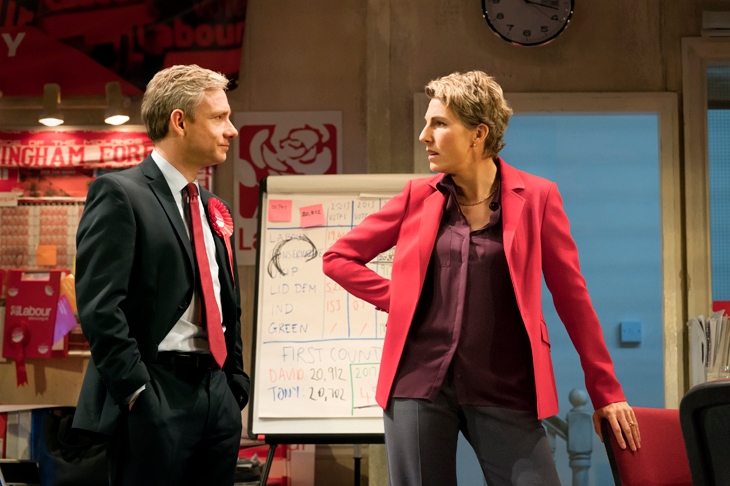Labour of Love is the new play by James Graham, the poet laureate of politics. We’re in a derelict colliery town in the East Midlands where the new MP is a malleable Blairite greaser, David Lyons. He arrives to find the office in crisis. The constituency agent, Jean, has handed in her notice but David is smitten by her acerbic tongue and her brisk management style so he asks her to stay. She agrees, reluctantly, and they settle into a bickering rivalry underpinned by affection. But is there more? Possibly, yes, but both are held back by their natural reticence and by fate. Secret declarations of love go astray. One letter is sent to the wrong person and another, written in code, makes sense only when read backwards.
These contrivances aren’t entirely satisfying. And the narrative has a tricky double-helix structure that is ingenious but ultimately damaging to the overall effect. The action starts in 2017, spirals backwards to 1990, then does a head-over-heels and twirls back up to the present day. This divides our concentration. We have to spend so much time deciphering the chronology that we haven’t enough left to focus on the passion between the not-quite lovers.
And the minor characters are poorly sketched. Jean’s husband is a surly Old Labour git in a Harold Wilson mac and a John Prescott scowl. David’s wife, Elizabeth, is a wellies-and-jodhpurs Sloane who seems allergic to the working class. More comedy might have been extracted from her awkwardness among the proles. No one says a word when she breezes into a Labour meeting wearing a purple power suit and looking like Margaret Thatcher about to launch a battleship.
The heart of the play is the charming, ramshackle friendship between David (Martin Freeman) and Jean (Tamsin Greig). Both are on top form and the script gives them ample scope to tickle the crowd. The jokes come thick and fast. And sometimes thin and fast, it must be admitted. When David entertains a visitor from China, he wonders if it would be racist to offer him a Chinese takeaway. Or would it be cannibalism? Jean, rather improbably, confuses the Bostons of Massachusetts and Lincolnshire, and David gets similarly muddled over Uri Geller and Yuri Gagarin. At the play’s crowning moment — when the gags should be reaching their zenith — David declares, ‘The answer is you, Jean.’ And Jean says, ‘Who’s Eugene?’
This show hasn’t the tense, farcical simplicity of Graham’s wildly successful This House. It’s an amusing, friendly stroll through the past three decades of centre-left politics. And good as it is, the material is highly perishable. By next year this will seem hopelessly out of date. Move fast.
Chris Hannan’s fascinating play What Shadows wants to cram too much into a single evening. It’s three dramas in one. It starts as a lyrical and appreciative biography of Enoch Powell. It then expands into a social critique of the 1960s and the ‘rivers of blood’ speech. Then the action fast-forwards to the 1990s and the play looks at Powell’s impact on migrants in Birmingham, and on the wider constituency of Britain. The coda is a philosophical dialogue on the nature of identity and prejudice.
Hannan shows us Powell at leisure, relaxing with his wife and friends, discussing church architecture over claret-fuelled picnics. To impersonate Powell is a huge challenge. The accent, for a start, is deeply tangled. The native Brummie tones are overlaid with a Home Counties fruitiness and some Australian top notes acquired during a pre-war stint as a classics don in Sydney. Ian McDiarmid does the vocal stuff admirably well. But he can’t capture Powell’s spirit, his menace, his embitterment. ‘I am volcanic with anger,’ he once said but there’s little sign of inner rage here, nor of its physical manifestation. McDiarmid gives us Powell as a camp dilettante, like a butterfly spotter, mincing through the groves of Shropshire, piping his orotundities in a girlish whistle.
Later we move to 1992 and we see him in frail old age. And here McDiarmid’s fluting delivery suits his subject far better. The play’s final section has the air of classic theatre. Powell is confronted by Rose, a formidably intelligent Afro-Caribbean woman, who argues that foreign inundations are not alien to Britain and its history. They are Britain and its history. She berates him for using his intellect to debauch the dispossessed, when he might have enlightened and elevated them. Of discrimination, Powell says, ‘Every molecule in every body is prejudiced in favour of its own survival.’ This universal statement, which Rose tacitly accepts, finds us all guilty of racism. What Powell objected to was the selective interpretation of the truth he had articulated. If the expression of tribal loyalties is encouraged among incomers but denied to natives there’ll be trouble. And there is.







Comments